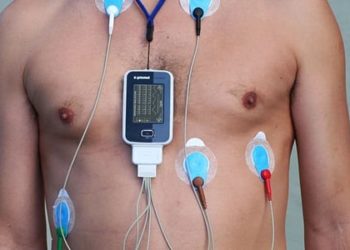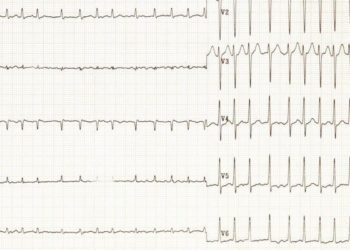Atrial fibrillation-specific management increases days alive and out of hospital
1. An atrial fibrillation-specific intervention program consisting of a home visit, Holter monitoring after hospital discharge, and prolonged follow-up was associated with a greater proportion of days alive and out of hospital, compared to standard intervention of routine primary care and outpatient follow-up
2. Atrial fibrillation-specific interventions did not significantly increase event-free survival compared to standard intervention
Evidence Rating Level: 1 (Excellent)
Study Rundown: The number of patients with atrial fibrillation has continued to rise recently, especially among the elderly, which has resulted in an increase in hospital admissions and a strain on healthcare. Management strategies specific to certain heart conditions such as heart failure or outpatient atrial fibrillation management have previously been shown to be effective at improving health outcomes. The standard versus atrial fibrillation-specific management strategy (SAFETY) study tested whether atrial fibrillation-specific management was superior to standard management at decreasing hospital admissions and improving survival in patients admitted with chronic atrial fibrillation without heart failure. Standard management consisted of routine primary care and outpatient follow-up, while the SAFETY intervention consisted of a home visit and Holter monitoring for 7-14 days after discharge by a cardiac nurse with prolonged follow-up.
The results showed a significantly greater proportion of days alive and out of hospital with the SAFETY intervention compared to the standard intervention. However, event-free survival was not significantly increased in the SAFETY group. Strengths of the study included limiting participants to those without common comorbid disorders associated with atrial fibrillation and using sufficient long-term follow-up to examine the effects of intervention. However, the study did not have sufficient power to examine differences in all-cause readmissions and deaths, and lacked the ability mask participants. This study represents a potentially practical and cost-effective method to manage the increasing number of patients with atrial fibrillation.
Click to read the study in The Lancet
In-Depth [randomized controlled trial]: The SAFETY study randomized 335 participants with non-valvular, chronic atrial fibrillation but without heart failure to receive either the SAFETY intervention (n=168) or standard intervention (n=167). Primary outcomes were all-cause mortality and unplanned readmission, measured as event-free survival and proportion of actual vs. maximum days alive and out of hospital. Investigators were masked to randomization but participants were not. Health reviews of all surviving participants occurred at 12 and 24 months of follow-up.
The mean follow-up for study participants was 905 days. 127 of 168 (76%) in the SAFETY group had an unplanned admission or died during the study, 137 of 167 (82%) in the standard group. At 12 months of follow-up, more participants in the SAFETY group achieved the primary outcome compared to the standard group, but the reverse was true at 24 months, with no difference between groups overall (median event-free survival 183 days [IQR 116-409] SAFETY group vs. 199 days [116-249] standard group; hazard ratio 0.97, 95% CI 0.76-1.23; p=0.851). Patients in the SAFETY group had 146,967 (92%) of 159,133 maximum days alive and out of the hospital (median 900 of maximum 937 days) vs. 141,133 (89%) of 158,466 days (median 860 of 937 maximum days) in the standard group (effect size 0.39, 95% CI 0.38-0.41; p=0.250). The proportion of actual vs. maximum days alive and out of hospital was significantly greater in the SAFETY group vs. standard group (99.5%, 95% CI 99.3-99.7 vs. 98.8%, 95% CI 98.8-99.4; effect size 0.22, 95% CI 0.21-0.23; p=0.039).
More from this author: Paradoxical response to beta-2 agonists found in African-Americans, linked to morbidity, Beta-blockers ineffective for treating combined heart failure and atrial fibrillation, Collaborative care model reduces depression in lung cancer patients [SMaRT Oncology-3 Trial], New dengue fever vaccine effective in phase 3 trial, Insulin pumps more effective than multiple daily injections in type II diabetics [OpT2mise trial]
Image: PD
©2014 2 Minute Medicine, Inc. All rights reserved. No works may be reproduced without expressed written consent from 2 Minute Medicine, Inc. No article should be construed as medical advice and is not intended as such by the authors, editors, staff or by 2 Minute Medicine, Inc.






![Vaccines for predicted influenza strains may provide wide protection [PreClinical]](https://www.2minutemedicine.com/wp-content/uploads/2014/11/18156_lores-75x75.jpg)
